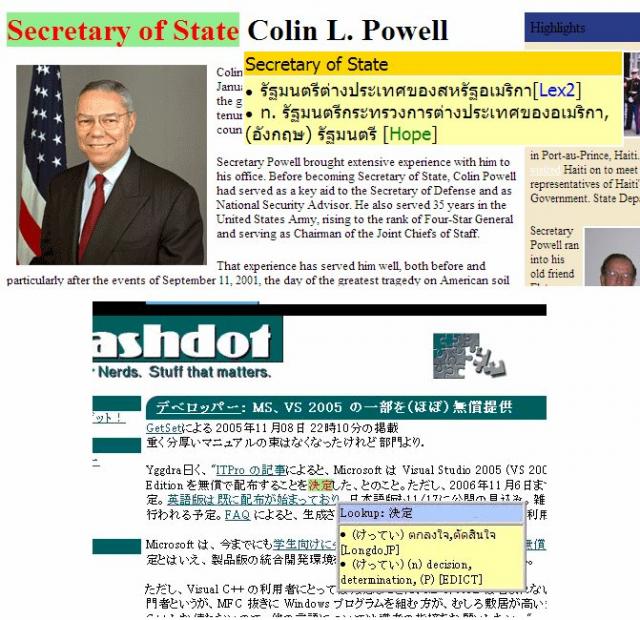|
บริการ ติดโพย (PopThai)
เป็นบริการเปิดพจนานุกรมอัตโนมัติ โดยผู้ใช้สามารถป้อนข้อความ ทีละประโยค หรือ เป็นหน้าเลยก็ได้ ไม่จำเป็นต้องทีละคำสองคำ
ระบบจะทำการแนบความหมายของคำหรือวลีภาษาต่างประเทศ
(ปัจจุบันสนับสนุน ภาษาอังกฤษ, ญี่ปุ่นและเยอรมัน)
ติดกับเนื้อหานั้นๆ และจะแสดงผลความหมายเมื่อเอาเมาส์ไปวางเหนือคำหนึ่งๆ
ช่วยให้สามารถเข้าใจเนื้อหาของเวบภาษาต่างประเทศได้สะดวกและรวดเร็วยิ่งขึ้น
ความหมายของคำจะปรากฏขึ้นมาเมื่อท่านเอาเมาส์ไปวางบนคำหรือวลีที่มีอยู่ในพจนานุกรม
โดยไม่จำเป็นต้องกดปุ่มใดๆ
ดังตัวอย่างในรูปข้างล่างนี้

คุณสมบัติ / Features
- แสดงความหมายของคำโดยอัตโนมัติ เพียงวางเมาส์ไว้บนคำที่ต้องการทราบความหมาย
- สนับสนุนเวบหลากภาษา (ปัจจุบัน ภาษาอังกฤษ ญี่ปุ่น และเยอรมัน)
- ค้นหาความหมายจากพจนานุกรมหลายชุดพร้อมๆกัน ในฐานข้อมูลของ Longdo ได้แก่
Lexitron2, Hope, Nontri, Longdo อังกฤษ-ไทย, Longdo เยอรมัน-ไทย เป็นต้น
- แสดงได้ทั้งความหมายของคำเดี่ยว และคำผสม ได้อย่างถูกต้อง
เช่น Secretary of State=รัฐมนตรีต่างประเทศของสหรัฐฯ (ในภาพตัวอย่าง),
High school=โรงเรียนมัธยมปลาย
- แสดงความหมายของคำที่แปรรูปจากคำในพจนานุกรมได้ เช่น
เมื่อวางเมาส์ไว้บนคำว่า executed/abusing ซึ่งไม่มีในพจนานุกรม
เครื่องจะแสดงความหมายของคำว่า execute/abuse ให้โดยอัตโนมัติ
- เรียกใช้งานได้ง่ายเพียงกดปุ่ม PopThai บน
Longdo Toolbar
เพื่อแนบความหมายหน้าจอที่เปิดชมอยู่ในขณะนั้น
- แก้ไข Link ในหน้าที่แสดง เพื่อให้สามารถเปิดชม Link เหล่านั้นผ่านบริการ PopThai
ได้ทันทีเช่นเดียวกัน
- สนับสนุนบราวเซอร์ชั้นนำทั่วไป เช่น Internet Explorer, Firefox, Chrome, Safari, Konqueror, etc.
- แสดง Link ให้ผู้ใช้ช่วยป้อนความหมายสำหรับคำที่ยังไม่มีอยู่ในพจนานุกรม
- ใหม่: บริการ Vocabulary แสดงสรุปรายการคำศัพท์พร้อมความหมาย สำหรับพิมพ์ออกมาอ่านได้สะดวก
วิธีใช้งาน ให้เลือกตรงตัวเลือกบริการด้านบน ให้เป็น Vocabulary แทน PopThai. (PopThai ในโหมดปกติ จะเหมาะกับการใช้งาน on-line
หน้าจอคอมพิวเตอร็ ส่วนบริการ Vocabulary เหมาะสำหรับท่านที่ต้องการพิมพ์รายการคำศัพท์และความหมายออกมาบนกระดาษไว้อ่าน off-line)
- ใหม่: บริการ Pronunciation Guide แสดงคำอ่านของคำใน เว็บ หรือ text ที่ป้อนให้ ข้างบนคำนั้นๆ, นอกเหนือไป
จากการแสดง pop-up ความหมาย. วิธีใช้งาน ให้เลือกตรงตัวเลือกบริการด้านบน ให้เป็น Pronunciation.
ขณะนี้ใช้ได้กับภาษาอังกฤษ (แสดงคำอ่านภาษาอังกฤษ) และภาษาญี่ปุ่น (แสดง hiragana เหนือคันจิ). บริการนี้
ใช้ extension ของ browser ที่ชื่อ Ruby ปัจจุบันมีแค่ IE browser ที่สนับสนุน ถ้าเป็น browser อื่นๆ จะเห็นคำอ่านปรากฎในวงเล็บแทน
วิธีใช้
ท่านสามารถป้อนเนื้อหาหรือ URL ของเว็บไซต์ที่ต้องการให้แนบความหมายนี้ ในช่องใส่ข้อความค้นหาปกติ
หลังจากนั้นเลือกบริการที่ต้องการ (เช่น ถ้าป้อนข้อความ ให้เลือก PopThai (text) ถ้าป้อน URL ให้เลือก PopThai (URL)) ถ้าท่านไม่เลือกบริการ
ระบบจะเดาบริการที่ท่านต้องการ จากข้อความที่ท่านใส่เข้ามา (ว่าเป็นข้อความหรือเป็น URL) โดยอัตโนมัติ,
จากนั้นกด Submit เป็นอันเสร็จ
ในกรณีที่ท่านใส่ URL ระบบจะไปทำการดาวน์โหลดเนื้อหาของหน้านั้นๆ มาและแนบความหมาย พร้อมแก้ไขลิงค์ต่างๆ ให้เป็นผ่านบริการ PopThai เ
พื่อที่ว่าเมื่อท่านกดที่ลิงค์ใดๆ ต่อไปจากเพจนั้นๆ ก็จะมีการแนบความหมายมาให้ด้วยในทันที
เพื่อเพิ่มความสะดวกในการใช้ท่านสามารถใช้ PopThai ผ่าน Longdo Toolbar โดยเมื่อท่านเปิดดูเว็บไซต์ใดๆ อยู่ตามปกติ และต้องการใช้บริการ PopThai สำหรับ
หน้านั้นๆ สามารถทำได้ทันที โดยคลิกที่ปุ่ม PopThai บน Toolbar รายละเอียดเพิ่มเติมโปรดอ่านที่ Longdo Toolbar
คำเตือน ในกรณีของ URL นี้ ถึงแม้ทางผู้ดูแลระบบลองดูจะได้ทำการทดสอบกับหลายเว็บไซต์
แล้วก็ตาม ยังมีบางเว็บไซต์ที่ข้อมูลเวลาที่ระบบไปโหลดมาจะแตกต่างจากที่ท่านเปิดดูโดยใช้ browser โดยตรง โปรดระวังด้วย และไม่ควรใช้กับหน้าเว็บไซต์ที่
ต้องการความถูกต้องสูง)
Problems & TODO
- inflected word support (German)
- support HTTP POST
- other foreign language support (Japanese, French)
|

